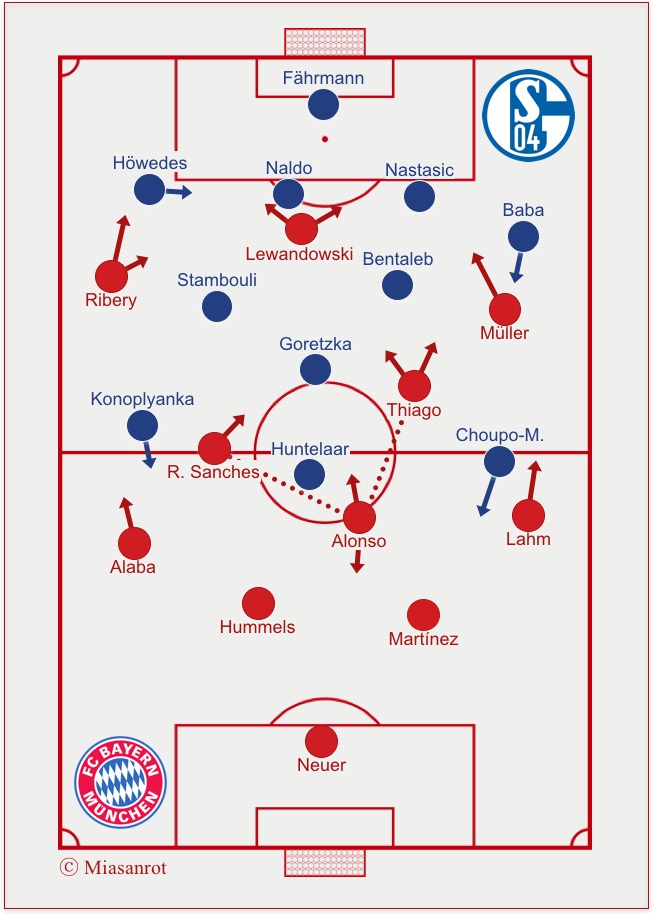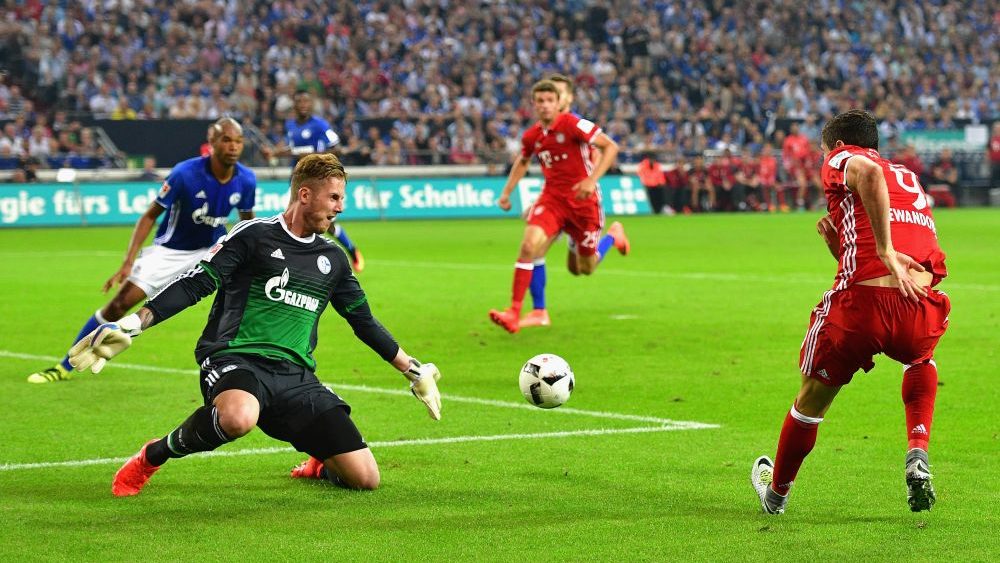Analysis: FC Schalke 04 – FC Bayern Munich 0:2 (0:0)
Second match-day of the new season. Again, a Friday night game. On paper the toughest opponent of the beginning of the Bundesliga season, the rebuilt Schalke team. It was an intensive game with many problems for the guests from Munich, who had strong final minutes to secure the three points.
 FC Schalke 04 – FC Bayern Munich, 09.09.2016, starting formations.
FC Schalke 04 – FC Bayern Munich, 09.09.2016, starting formations.3 things we noticed
1. Weak positional play creates problems
It was an unfamiliar sight in the first 70 minutes. Bayern had enormous problems to occupy the right spaces for long parts of the game. The positional play with an optimized usage of the spaces was a cornerstone of the tenure of Guardiola. The game against a physical and well prepared Schalke team showed that Ancelotti’s direct playing style does not function automatically.
Repeatedly the game swayed to and fro with Bayern being able to take control of the ball and the game. Repeatedly the connections were missing to start the attack after Bayern recovered the ball, because the team lacked a proper positioning or the ways into the back of Schalke’s midfield were to long. This created odd 6-3-1 or 2-3-3-2 formations, which seemed very random. Each time Bayern were missing some calm and didn’t manage to step on the ball, the home team used the chaos to intercept vertical passes and initiate counter attacks. Favorably in the back of the advanced full-backs. Schalke seemed to be prepared for the situations, since Naldo and Co. repeatedly anticipated vertical passes from Bayern’s backline and moved into the passing lanes very early. Three chances for Schalke were created by these interceptions, including Huntelaar’s shot at the crossbar. Schalke managed to intercept nine balls in the first half alone. In the end the number rose to 22. Only after the 75th minute with Vidal and Kimmich alongside Thiago on the six the structure returned to Bayern’s game.

(Photo: Patrik Stollarz / AFP / Getty Images)
All of these elements are the flipside of the topic that has been discussed in the last days, “Ancelotti gives his players more freedom on the pitch”. The automatisms, which Guardiola’s positional play implemented, do come in very handy to get out of situations under pressure and to tire out an opponent, because they the opponent will have to run for long spells without recovering the ball. The game against Schalke demonstrated how a little more chaos in the game can be beneficial to an physical opponent with enough lungs. Nevertheless the game also showed how Bayern is nonetheless able to create enough chances to win these games. Ancelotti’s task has to be to find a better balance between the direct and vertical play and a necessary amount of control of the game.
2. Ancelotti’s subs won the game
It sounds like a statement by Captain Obvious, when the decisive goals were scored after the three substitutions, but Ancelotti’s subs did have an enormous impact on Bayern’s game. The final 15 minutes were Bayern’s best and most structured phase of the game. Ancelotti’s decision to move Thiago on the 6 after taking off Alonso did pay off instantly. The combinational play with Vidal and Kimmich seemed well-practised, more natural and gave Bayern some of the missed structure. Evidence? After Kimmich stepped onto the pitch in the 70th minute Bayern’s passing accuracy rose to 93%, after 81% before. The three midfield players were able to secure the centre against the hard fighting trio of Bentaleb, Goretzka and Stambouli. 8 out of 18 shots on goal were fired in the last 20 minutes.
Douglas Costa’s substitution also made an instant impact. The hyperactive Brazilian was part of 3 scoring chances in 30 minutes and had two successful dribbles. Ribery had his feet in one scoring chance and three dribbling in his 60 minutes. Moreover Costa was involved in Lewandoski’s clear-cut chance (75th) and in the run-up to the 2-0.
It wasn’t entirely sure which bench would be the stronger factor in this game. By now Schalke is also able to create an impact on the game with players like Embolo, Meyer and Geis coming from the bench. Today Bayern’s substitutions created the difference in a game that was undecided before and tipped the game to Bayern’s favour.
3. Sanches has to get used to the tempo
No, it was no perfect start for the 19-year-old summer signing. Sanches seemed restless and lost his rhythm after a couple of misplaced passes in the beginning of the game. Interestingly the young Portuguese repeatedly drifted to the left wing, to have a little more time to control the ball.
Sanches only played 48 passes and only 85% of these found a teammate. He also only won 35% of his duels and was not able to have an impact on the game. Especially his mileage was poor. Kimmich registered almost as many sprints and intensive runs in his 20 minutes as Sanches did in his 70.
Sanches only showed little glimpses of the capabilities that made Bayern want him. He is robust, hard-running, intuitively creates good visual connections and has good ideas in the passing game. He has to get used to the tempo of the game and his teammates.
| FC Schalke 04 – FC Bayern Munich 0:2 (0:0) | |
|---|---|
| FC Schalke 04 | Fährmann – Höwedes, Naldo, Nastasic, Baba – Stambouli (86. Kolasinac) – Bentaleb, Goretzka – Choupo-Moting, Konoplyanka (55. Embolo) – Huntelaar (67. M. Meyer) |
| Bench | Nübel – Riether, Aogo, Geis |
| FC Bayern Munich | Neuer – Lahm, Hummels, Javi Martinez, Alaba – Xabi Alonso (61. Vidal) – Thiago, Renato Sanches (71. Kimmich) – T. Müller, F. Ribery (61. Douglas Costa) – Lewandowski |
| Bench | Ulreich – Juan Bernat, Rafinha, Green |
| Goals | 0:1 Lewandowski (81.), 0:2 Kimmich (90.) |
| Cards | Yellow: Höwedes, Baba / Hummels, Renato Sanches, Vidal, Thiago |
| Referee | Manuel Gräfe (Berlin) |
| Attendance | 62.271 (sold out) |









